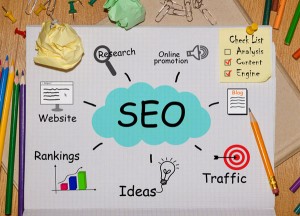
Search Engine Optimization Basics
Search Engine Optimization (SEO) is one of the key factors that needs to be taken into consideration when you are first developing your website. There are many things that need to be taken into account, and if they are done as the website is being built it will save you a lot of time down the road.
The purpose of SEO is to tell the search engines like Google what your site is all about and what words and phrases your site should show up for. There are quite a few different aspects to SEO that all play a part in the effectiveness of your SEO. All of the different aspects are important in their own right but as a whole are what makes your site searchable.
The main aspects that you need to pay attention to when you are working on your website is the on page SEO that is done for each page of your website and all of your blog posts. With all that in mind, let me go over briefly the main things you should be considering when developing your website.
Title Tags & Meta Descriptions
Title tags are going to be the keywords you use to give the search engine an idea of what that page is going to be about. You will want to use one main keyword and some variations of that keyword on each page but you want to keep each pages keyword unique so that you don’t get downgraded for trying to trick Google.
Also make sure that the key words/key phrases you use sound like natural language. The search engines have gotten very proficient at deciphering natural language that a user would be able to engage with versus keyword laden garbage that doesn’t make much sense and doesn’t flow as written language should.
Meta Descriptions aren’t as important to the search engines anymore as they used to be but they are still very important because they will be the first impression that you visitor has when looking for your site on Google. Make sure again that the meta description is in natural sounding language and does include your main keyword for the page.
Heading tags
Every page that you create should always have an h1 tag and only one 1 h1 tag. Within the h1 tag you should have your main keyword that you are focusing on for that particular page. The h tags range from 1-6 which vary in importance and size on your page, 1 being the biggest and most important heading while 6 is the smallest and least important. You can use any of the 2-6 heading tags as many times as you wish. The heading tags are just as important for the user as they are for the search engines as well. The h tags help break up the content and adds to the readability of the website as well as giving the search engine more of an idea of what the whole page is about.
Content
The most important thing on every page is the content. The phrase “content is king” has and will remain to be the mantra of SEO. With the new updates that Google has made to its search algorithm, content is more important than ever. When writing your content, make sure that it is written for the user first and foremost. Google’s new algorithm looks specifically for content that is written in natural language and is not heavily laden with keywords all over the place. You will actually get bumped down if you are going overboard with the key word stuffing and your users will not want to read your content, so make sure to avoid stuffing keywords everywhere.
